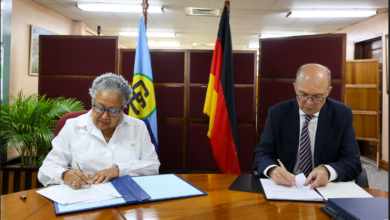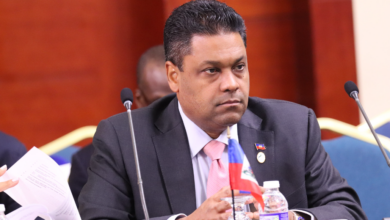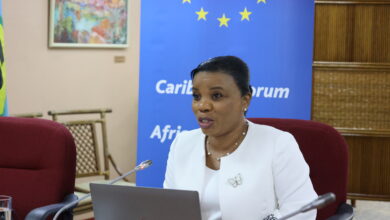Colleague Heads of Government of the Caribbean Community;
Honourable Ministers of Government of the Community;
Your Excellency Dr Edwin Carrington;
Sir Shridath Ramphal, CARICOM’s Chief Negotiator;
Other Heads of Delegations;
Distinguished guests;
Ladies and gentlemen:
There is a particular privilege that comes with speaking last. I can refrain from saying what I intended to say, since that would be to repeat what the Heads who have preceded me have said already.
I therefore have the liberty of choosing simply to endorse those remarks made by the preceding speakers, with which the majority of those who are assembled here agree.
I would, however, specifically like to join in welcoming to the Conference of Heads, the Honourable Mr Pierre Charles, the Prime Minister of Dominica. I warmly welcome you, Prime Minister Charles.
I also welcome warmly to the Conference of Heads of the Community, the new Prime Minister of St Vincent and the Grenadines, the Honourable Arnhim Eustace. Welcome Prime Minister Eustace.
Colleague Heads: Speaking as the most recently elected Head of Government, I am gratified that the people of my country have given me the privilege of continuing to contribute to the regional programme as a member of the Conference of Heads of the Community.
Colleague Heads, Conference Delegates: I wish to join in the tributes that have been showered upon today’s recipients of the distinguished Order of the Caribbean Community.
I salute Sir George Alleyne.
I salute Honourable George Price.
I salute the Mighty Sparrow, “The Birdie,” who is also known as Dr Slinger Francisco.
Delegates will forgive me if I take especial pride in the award of the Order of the Caribbean Community to the Mighty Sparrow.
To deflect any perception that my special pride in the honour to be conferred on Sparrow might reflect a measure of insularity, let me suggest that Prime Minister Keith Mitchell’s pride in this particular award should be no less ardent than mine.
Caribbean Brothers and Sisters: Many of us see the Mighty Sparrow as the quintessential Caribbean Man. Like our region’s cricketers – when they are winning – Sparrow is a “Belonger” in every West indian Village, in every West Indian town, in every West Indian city.
Sparrow epitomises the characteristics that define our pre-eminent cricketing super heroes. Like them, he is original, irreverent, irrepressible and, quite unlike our region’s political leaders, virtually irreplacable in the hearts of the people.
Sparrow and Baron Constantine, George Headley and Sir Garfield Sobers, Sir Frank Worrell and Everton Weekes, Sir Vivian Richards and Bob Marley, all are true leaders of regional integration.
This pantheon of Caribbean heroes long ago crossed all boundaries of class and race and place, and set the stage for the political leadership that has brought Caribbean integration to its present pivotal moment.
Colleague Heads: At this meeting of the Heads of the Community, we will, and we must, take action to concretise the Single Market and Economy. In this context, it is vital that we authorise the execution of a regional communications programme to prepare all stakeholders in our member countries for the free movement of people, capital and enterprises, that will come in addition to the free movement of goods, in the Caribbean Single Market and Economy.
As we approach the Third Summit of the Americas, we must make every effort to increase the pace of our progress to full regional integration, on all fronts.
Only the strongest, most cohesive Caribbean Single Market and Economy will ensure that the Caribbean People will derive maximum benefit from NAFTA, initially, and from the Free Trade Area of the Americas, ultimately.
Colleague Heads, Ladies and gentlemen: Saint Lucia’s proposal for a Tourism Summit is very timely. I urge the Conference to attach the greatest urgency to this proposal.
We ought not to assume that a soft landing for the slowing United States economy will insulate the Caribbean from negative fallout.
Indeed, it is predicted that a soft landing for the American economy could well result in a meltdown for emergent economies around the world. When there is a loss of confidence, consumers as well as investors, apply the brakes.
Tourism, a discretionary option for consumers, is very vulnerable to such developments.
This all brings out the imperative for regional strategies in support of tourism, the principal propellant to most Caribbean economies. A tourism Summit, before next winter, should of necessity, be regarded as an imperative.
Colleague Heads: Together with illicit drugs, AIDS is a serious threat to every Caribbean country. I again implore that we treat as a regional crisis, the AIDS pandemic in the region.
We have achieved a notable measure of effectiveness in our joint counter-narcotics programmes. We must devise collective strategies to combat the spread of AIDS; and to provide care for the victims of AIDS in our region.
Colleague Delegates: The Caribbean continues to be the region most heavily penetrated by foreign television and by foreign culture.
There is now wide opinion that violence in Caribbean societies, including violence against women, may be casually linked to the surfeit of gratuitous violence consumed by viewers of imported television programming notably American television programming.
Surely the time has come for us to draw on the immense creative resources within the region to construct a significant Caribbean presence on our television screens. We, in the Caribbean, possess much too rich a cultural heritage to permit our identity, our self-image, our self worth to be shaped, to be defined, by other peoples, in other lands.
Now, ladies and gentlemen, I move from the “should”, to the “shall”. Members of the Conference of Heads shall, momently, sign the Agreement establishing the Caribbean Court of Justice. As we proceed to this exercise, we must be mindful that this institution is still some distance from being fait accompli.
Last week, I received representations from the Trinidad and Tobago Bar expressing significant concerns over the establishment of the Court, at this time. Investors have expressed similar concerns.
Confidence in the Caribbean Court of Justice as the highest Appellate Court for our countries is not bolstered by the capricious adventurism with the Constitution and the Law that has been taking place in my own country. I am happy to confirm that this morning I received the President’s written agreement to act on the advise of the Prime Minister on the appointment of Senators and Ministers.
The region’s political leadership is yet to convince all of our stakeholders that the Caribbean Court of Justice will indeed constitute a tribunal of superior credentials to the Judicial Committee of the Privy Council; as was envisaged by the West Indian Commission in its 1992 Report.
Colleague Heads: Given what I have just said, let me assure the Conference of the Government of Trinidad and Tobago’s continuing commitment to and support for the establishment of the Caribbean Court of Justice. Indeed, the temporary Headquarters of Port-of-Spain for the Court will be ready for occupancy by the end of April 2001.
Also scheduled for next month, ladies and gentlemen, are general elections in two CARICOM Member States. In neither case has the election date been determined, essentially, by the construct of the Constitution and the Representation of the People’s Act in those countries. We must examine the emerging phenomenon in our region in which elections results are being rejected by political parties, primarily because they do not like the results.
Even with a free press, access to information, a fair and open democratic process, the effective functioning of the Parliamentary system, we see the emergence of a certain type of leader who is not prepared to accept the expression of the people’s will if that leader is not given a majority by the electorate.
Today, Guyana, St. Vincent and the Grenadines, Trinidad and Tobago. For whom shall the bell next toll? It requires no gift of clairvoyance for us to see this tendency rapidly leading to a rejection and eventual subversion of the rule of law in the region.
Colleague Heads, Delegates: At this, the start of what is technically the first year of the new century and the new millennium, let us seize every opportunity to make this a place in time where hope and history rhyme.
Let us agree that here, at the very beginning of the new Century and the new Millennium, we will all serve our societies to their greatest benefit if we listen with intensified sensitivity to the anxieties of the young people of the region.
Nowhere is this of greater urgency than in those situations where ethnic, cultural and religious diversity is a factor of national life. Our great obligation, as we develop the mechanisms and institutions of CARICOM, is to shape a region that will best serve our young people today, and the young people of generations yet unborn.
This, I submit, is as compelling a reason as any other, for our presence here this week.
I thank you.
May God bless you all.





